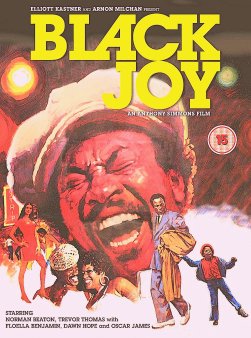
Classic Film Club on May 7 will screen another Anthony Simmons film. In Black Joy (1977) Simmons again uses London as his backdrop but this time seen from the perspective of a naïve young immigrant in an episodic narrative adapted from Jamal Ali’s screenplay, Dark Days and Light Nights.
PLOT
Ben Jones (Trevor Thomas), an innocent African boy from Guyana, arrives to set up a new life for himself in London but things go wrong from the get-go. After a cavity search at Heathrow, he is hustled out of most of his money by ten year old Devon (Paul J. Medford) on the streets of the capital and has to spend the night in a hostel. Meanwhile Devon’s mother, Miriam (Floella Benjamin), discovers the money and her lover, Dave King (Norman Beaton), offers to be the responsible adult and take care of it – though, realising it is stolen anyway, he actually keeps it for himself.
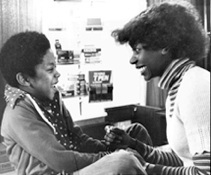 Next morning Ben spots Devon and follows him around Brixton, hoping to be reunite with his wallet. He confronts the boy in Miraim’s cafe but Dave is on hand to calm the situation, hiding Devon’s guilt from his mother and offering to extend a loan to the newly arrived Guyanian. Naïve Ben is unaware the money he is being loaned comes from his own wallet and thus begins a darkly humorous relationship! Eventually Ben finds a job and, seeing an opportunity to take a cut of the rent, Dave offers him a place to stay. Next, realizing Ben is still a virgin, Dave arranges a visit to Soho for the new-comer and this marks the beginning of a life of night-clubs, betting
Next morning Ben spots Devon and follows him around Brixton, hoping to be reunite with his wallet. He confronts the boy in Miraim’s cafe but Dave is on hand to calm the situation, hiding Devon’s guilt from his mother and offering to extend a loan to the newly arrived Guyanian. Naïve Ben is unaware the money he is being loaned comes from his own wallet and thus begins a darkly humorous relationship! Eventually Ben finds a job and, seeing an opportunity to take a cut of the rent, Dave offers him a place to stay. Next, realizing Ben is still a virgin, Dave arranges a visit to Soho for the new-comer and this marks the beginning of a life of night-clubs, betting 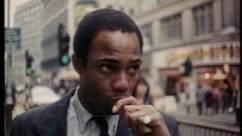 shops, car dealing, poker games and disappointment.
shops, car dealing, poker games and disappointment.
It sounds unusual material for comedy, but that indeed is how this film is categorized. As in Fagin’s school for pickpockets, dark humour is wrung from the corruption of innocence and the need to survive. It is also a film about trying to fit in and adapting to foreign culture.
CONTEXT
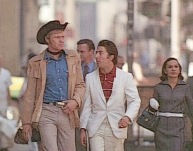 The encounter between Ben, the young Guyanian, and wannabe hustler Dave King is a twist on the relationship seen in Midnight Cowboy (1969) between Joe Buck & Ratzo Ritzo (right, top – note the white suit). Or rather, it would be were it not for the fact that Dave’s attempt to emulate icons of American film is comically inept.
The encounter between Ben, the young Guyanian, and wannabe hustler Dave King is a twist on the relationship seen in Midnight Cowboy (1969) between Joe Buck & Ratzo Ritzo (right, top – note the white suit). Or rather, it would be were it not for the fact that Dave’s attempt to emulate icons of American film is comically inept.
This satirical nod to American cinema was surely intended (right, bottom of these 3) to casts a critical eye on the so-called Blaxploitation genre that was then so prevalent. An example of the kind of outfit seen in those films is shown here on the right (note the floppy cap – very similar to Dave King’s look).
Black Joy’s vivid characters, flamboyant costumes and its 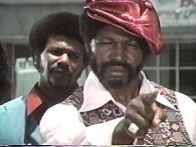 vibrant soundtrack bears this out, while a very British humour in Black Joy undermines these references. For some (one has to say, poker-faced) critics, however, all this sits uncomfortably with the film’s apparent wish to tackle otherwise serious issues of inequality and unemployment.
vibrant soundtrack bears this out, while a very British humour in Black Joy undermines these references. For some (one has to say, poker-faced) critics, however, all this sits uncomfortably with the film’s apparent wish to tackle otherwise serious issues of inequality and unemployment.
So I would argue that, despite sailing close to racial stereotyping (something the film’s star, Norman Beaton fought against for years), the film’s unsentimental narrative, charismatic performances and preparedness to face the frankly brutal 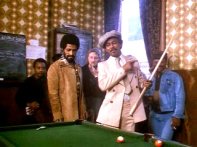 financial realities of ghetto life in 1970s London, rises above such censure. In the end the film overcomes its critics by making us laugh with these characters not at them.
financial realities of ghetto life in 1970s London, rises above such censure. In the end the film overcomes its critics by making us laugh with these characters not at them.
CAST
Trevor Thomas (who plays Ben) was already a veteran child actor, having appeared in Doctor Who, serialised productions of Dickens and The Professionals among other things. He went on to have a successful career in film and TV, appearing in such programmes as Grange Hill, The Sweeney, Minder and Silent Witness.
 Paul J. Medford (born, 1967) playing Devon, the street-wise boy, is perhaps best remembered now for playing Kelvin Carpenter in Eastenders (left) – from its inception in 1985 to 1987. After quitting the show to become a singer dancer, he played in several stage musicals and was nominated for a Laurence Olivier Award in 1991.
Paul J. Medford (born, 1967) playing Devon, the street-wise boy, is perhaps best remembered now for playing Kelvin Carpenter in Eastenders (left) – from its inception in 1985 to 1987. After quitting the show to become a singer dancer, he played in several stage musicals and was nominated for a Laurence Olivier Award in 1991.
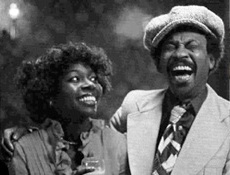 Born in Guyana in 1934, Norman Beaton had faced the harsh realities of immigration to Britain in the early 1960s, before going to college and becoming the first black teacher in Liverpool. Playing guitar in Liverpool clubs to support his young family, he got to know poets and musicians in the city’s art scene and subsequently wrote a musical drama, Jack of Spades, for the Everyman Theatre. Relocating to Bristol, he worked as a composer and actor at the Old Vic, before landing his first TV role in 1964. Despite stereotypical roles in Z Cars and the like, Beaton was praised for his Ariel in Jonathan Miller’s production of The Tempest (1970). Finally, he was selected for the lead in LWT’s The Fosters (1976-77), the first black-led UK sitcom. Then came Empire Road (1978-79), the first black UK soap, followed of course by Desmonds (1989-94). His influence has been
Born in Guyana in 1934, Norman Beaton had faced the harsh realities of immigration to Britain in the early 1960s, before going to college and becoming the first black teacher in Liverpool. Playing guitar in Liverpool clubs to support his young family, he got to know poets and musicians in the city’s art scene and subsequently wrote a musical drama, Jack of Spades, for the Everyman Theatre. Relocating to Bristol, he worked as a composer and actor at the Old Vic, before landing his first TV role in 1964. Despite stereotypical roles in Z Cars and the like, Beaton was praised for his Ariel in Jonathan Miller’s production of The Tempest (1970). Finally, he was selected for the lead in LWT’s The Fosters (1976-77), the first black-led UK sitcom. Then came Empire Road (1978-79), the first black UK soap, followed of course by Desmonds (1989-94). His influence has been  massive, as this BFI page makes clear. The BBC Radio 4 Norman Beaton Fellowship, launched in 2003, now provides training opportunities for young actors in radio drama.
massive, as this BFI page makes clear. The BBC Radio 4 Norman Beaton Fellowship, launched in 2003, now provides training opportunities for young actors in radio drama.
It was back in 1970, playing Nanki-Poo in The Black Mikado (an all-black adaptation of Gilbert and Sullivan’s operetta), that Beaton first worked with Floella Benjamin (the two are shown on the set of teh film above), who plays Devon’s mother, Miriam. As you may know, Floella Benjamin is now a Lib Dem life peer, known as Baroness Benjamin of Beckenham, OBE (seen in her robes on the left).
Watch out too for a fleeting, cameo appearance by the late, great Vivian Stanshall.